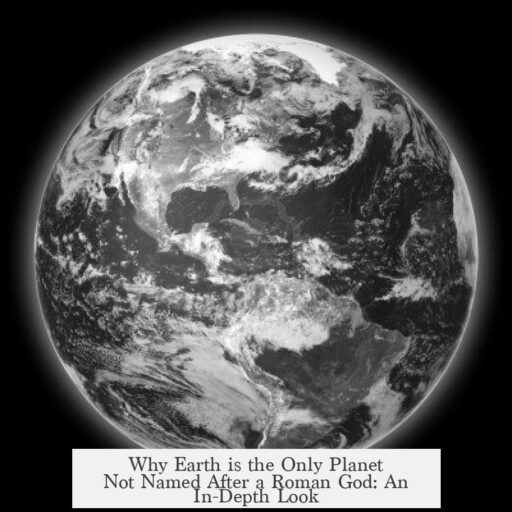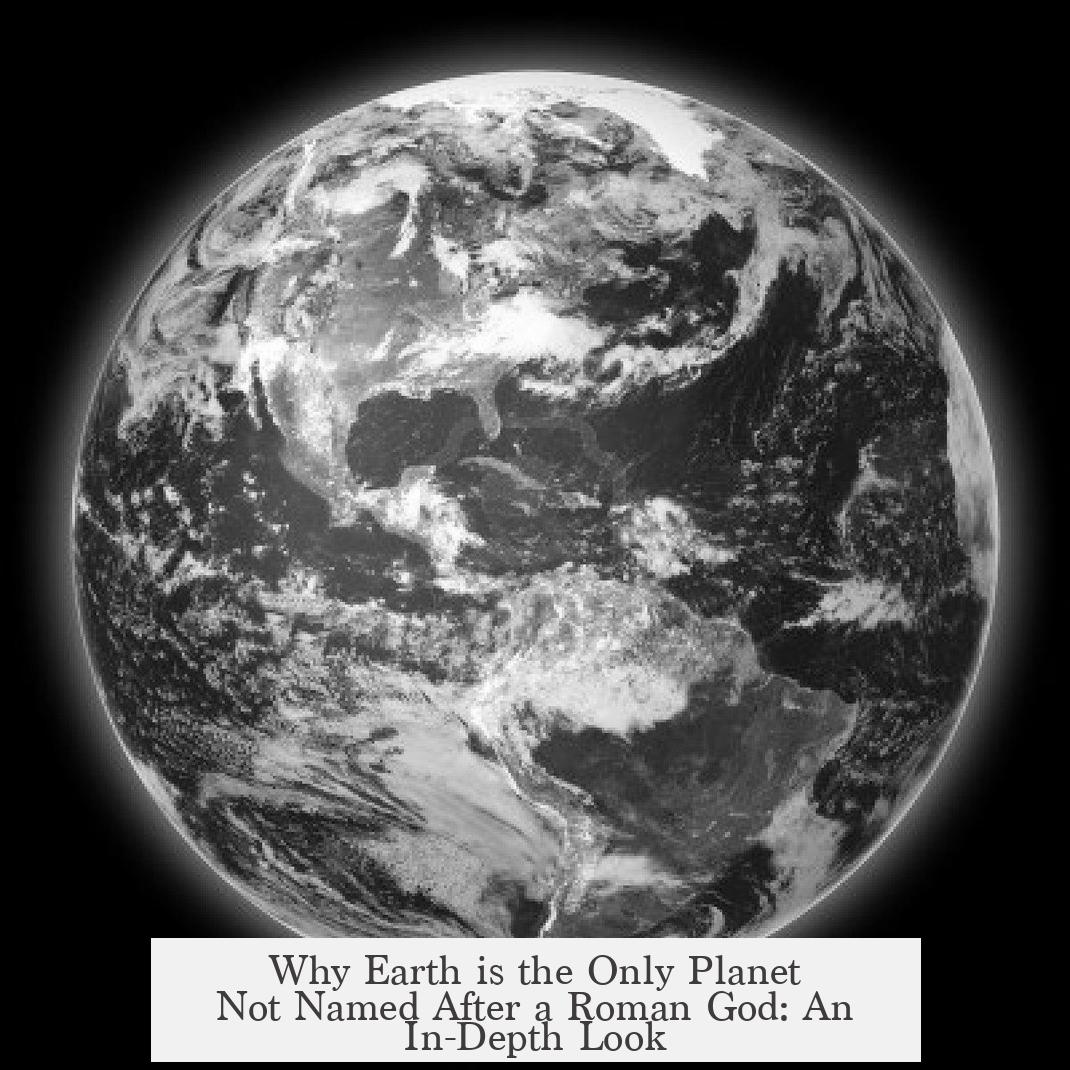Earth is the only planet not named after a Roman god because its name derives from ancient Germanic languages, reflecting everyday language rather than mythological tradition. Unlike the other planets, whose names stem from Roman deities, “Earth” originates from Old and Middle English words like eorþe, which described the ground or soil. This linguistic origin highlights the unique cultural and conceptual approach to naming our home planet.

In ancient times, people did not view Earth as a planet in the modern sense. The classical world saw Earth as the unmoving center of the universe, beneath the Moon and other celestial spheres. Philosophers like Cicero described the cosmos as concentric spheres, with Earth fixed at the core and the seven classical planets—including the Sun and Moon—moving in orbits above. This geocentric model placed Earth in a distinct category, unlike the wandering gods embodied by the other planets.
Because Earth was not considered a planet, it did not receive a name derived from Roman mythology. The names of other planets matched their bright, mysterious appearances and were linked to gods such as Mars (war), Venus (love), and Jupiter (king of gods). Earth’s name instead came from common language related to soil and land, which was fundamental to daily life. This practical naming prevented the replacement of the English term with a Roman loanword, as “earth” was too ingrained to be displaced.

Moreover, naming depends heavily on language and culture. While Roman gods inspired most planetary names, the English word “Earth” reflects a Germanic linguistic heritage. This exemplifies how cultural and linguistic factors influence astronomical terminology.
It is worth noting that not all planets follow the Roman god tradition strictly today. For example, Uranus has a Greek origin, showing that modern naming is more flexible. However, Earth’s case is unique due to its ancient conceptual status and embedded place in everyday language.

- Earth’s name derives from ancient Germanic words related to soil and land.
- Ancient cultures did not consider Earth a planet but the cosmos center.
- Roman planetary names come from gods reflecting planets’ appearances.
- Language and culture shape planetary naming traditions.
- Uranus is another planet not named after a Roman god but from Greek.
Why is Earth the Only Planet Not Named After a Roman God?
The simple answer: Earth is not named after a Roman god because, historically and linguistically, it wasn’t considered a planet like the others, so it never got a divine name in Roman tradition. That, plus its name comes from old Germanic roots tied to everyday ground and soil—not celestial gods. Sounds straightforward? Let’s dig deeper.

Why does Earth stand out in our celestial lineup? Have you ever paused to wonder why Mars, Venus, Jupiter, and their cosmic cousins proudly bear the names of mighty Roman gods, yet Earth—the blue marble we call home—is named after… dirt? The answer lies in history, language, and how ancient cultures viewed the cosmos.
The Ground Beneath Our Feet: Earth’s Linguistic Roots

The word “Earth” traces back to English’s Germanic ancestors, passing through Old and Middle English before arriving in modern form. Middle English eorþe already referred to the ground or soil beneath us—and importantly, it was the go-to when translating the Latin Terra.
“Earth is a word which comes from English’s Germanic ancestors, via Middle and Old English… Middle English eorþe already meant the planet Earth, especially when translating the Latin word Terra.”
Put simply, while the Romans had their name Terra, the English-speaking world kept its own word. Talking about the ground is one of the most everyday things we do. That constant use made it incredibly tough for a foreign word like Latin’s Terra to dislodge the English equivalent. This resistance to loanword displacement means English speakers never swapped “Earth” for a Roman god’s name.
Does language shape how we see the world? Absolutely. The names we give reflect culture and usage more than cosmic facts. Planets feel divine or exotic, but the Earth feels like home—and that shows in its name.

Earth and the Ancient Mind: Two Different Worlds
Today, it’s second nature to think “Earth is a planet.” Not so in antiquity. Back then, the Earth was the ground beneath your feet, utterly different from the wandering stars and shining spheres above.
“Planets were so tremendously different that they really had no relation to the mudball we live on.”
Planets were bright, moving objects in the sky—celestial, eternal, and divine. Earth? Just the dirt. Unmoving, central, mortal. This sharp conceptual divide meant Earth did not share the same category as the other “planets.” Naturally, it did not get a Roman god’s name.
Interestingly, ancient names mirrored what people saw. Planets gleamed and dazzled; their names highlighted their appearance or divine patrons. Earth looked like, well… earth. No glitz and godly glamour needed.
The Roman Cosmos and Earth’s Special Status
Want to hear something wild? Cicero in his Dream of Scipio describes the universe as nine spheres: seven planets, including the Sun and Moon (yes, those were counted as planets!), and **Earth sitting fixed at the center.**
“Everything is eternal above the Moon; everything beneath it is mortal and transient… Below the Moon lies the earth, the ninth and lowest of the spheres, at the very center of the universe. Fixed in place, the earth does not move.”
That’s a big clue. Roman astronomy and philosophy literally put Earth in its own category—fixed, mortal, lowly, and central. The other worlds whirled around like divine dancers; Earth stood still as the stage itself. No wonder Romans never named Earth after a god—the very idea of Earth as a planet was foreign to them.
In fact, to the Romans, naming planets after gods was about honoring those celestial wanderers. Earth was too mundane, too essential, and fundamentally different.
Modern Naming Conventions: Earth Isn’t Totally Alone
Here’s a fun twist: Earth isn’t the only planet in our solar system not named after a Roman deity. Uranus, discovered much later, breaks the pattern by adopting a Greek god’s name.
“Uranus is a Greek name.”
This exception shows that naming isn’t always straight lines or rigid Roman lore. It reflects times, cultures, and sometimes the whims of astronomers. Earth’s name, then, is part linguistic heritage, part cultural perspective, and part human nature.
So, Why Should We Care?
Understanding why Earth alone stands apart in naming tells us a lot about how human beings view their place in the universe. It reveals how language holds onto familiar roots even amidst sweeping cultural changes.
It also shows how science and myth intertwine. Ancient people weren’t just naming planets randomly; they created a cosmic story where gods ruled the night sky, and Earth was the humble stage for life. Naming isn’t just labeling; it’s storytelling.
Next time you look up at the stars or walk barefoot on the Earth, remember: Earth’s name carries centuries of linguistic history and a worldview that saw it as unlike any wanderer in the heavens.
Summary Table: Why Earth Isn’t Named After a Roman God
| Reason | Explanation |
|---|---|
| Linguistic Roots | English ‘Earth’ comes from Germanic words for ground/soil, predating Latin and resisting loanword replacement. |
| Ancient Perception | Earth was viewed as the ground, fixed and mortal, unlike divine, moving planets. |
| Roman Cosmology | Earth was the universe’s center, unmoving and distinct from the seven planetary spheres. |
| Modern Exceptions | Uranus has a Greek name, showing not all planet names follow Roman god conventions. |
Isn’t it fascinating how something as simple as a name unravels layers of history, culture, and perception? Earth’s name reminds us that language roots run deep, and our view of the cosmos has shifted dramatically over millennia.
So next time a friend asks why Earth is the odd one out, you’ve got a story that spans gods, ancient minds, languages, and the very ground we walk on. Now that’s a conversation starter!





